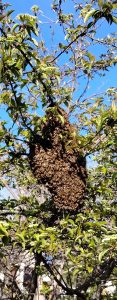As I was walking through the Northside neighborhood in Downtown San Jose (on my way to work), I noticed a bee swarm attached to a tree in close proximity to the sidewalk. I was able to get an amazing photo of the swarm and proceeded quickly on my way. Of course, this encounter led me to the library catalog to learn more about Bees, and to share my findings with you!
- Bees are an important part of our Ecosystem. Their ability to spread pollen accounts for the health of many plants, flowers, and vegetables.
- Bees provide food for wildlife and for humans. There are many medicinal uses for bee pollen, bee honey, and bee venom.
- There are 20,000 species or bees in the world, some of which are endangered. This is due to climate change, loss of habitats, and the widespread use of pesticides.
- Bees are important in much of the world's folklore and mythology: Bees were considered messengers between the world and the Spirit Realm by the ancient Celts.
- A folk tradition in the British Isles and in the United States called "Telling the Hive": with this tradition the beekeepers would inform the hive about birth, marriages, and deaths that occurred. The Royal Beekeepers informed the bees of the passing of Queen Elizabeth II, and that the new King would be good to them. If the tradition is not followed, the folk belief is that the bees will stop producing honey, and possibly go into a colony collapse.
- If you encounter a bee swarm: Stay Calm. Do not make any sudden movements or noises. Walk away and notify local authorities or a beekeeper to remove the swarm.
- Santa Clara Valley Beekeeper's Guild is an excellent local resource that can provide swarm removal, ethically and responsibly.
If you (like me) are concerned about preserving our Ecosystem, think about taking part in "No Mow May" or "Low Mow Spring" to encourage the plants and flowers that help the Bees with pollination and with their survival.



Add a comment to: Springtime: A Time for Bees